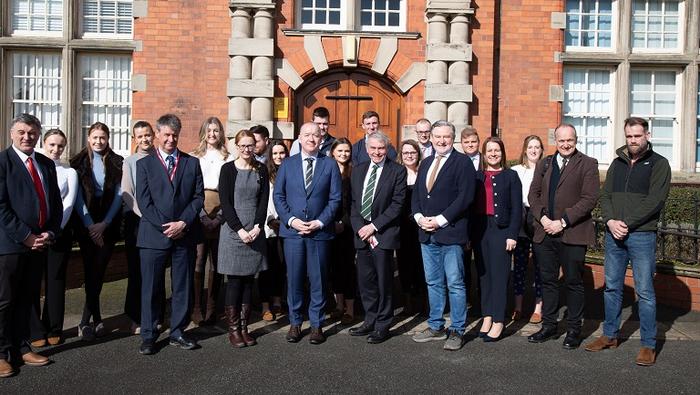MPs Investigating Land-Based Education and Careers Gather Evidence at Harper Adams University
The formal Parliamentary evidence session was one of a series being held by the Environment, Food and Rural Affairs (EFRA) Select Committee, which is currently investigating the relationship between education and the land-based industries and how effective current education at all levels is at equipping students with the necessary skills and knowledge for the sector.
It was the first Parliamentary evidence session held at Harper Adams University, and before the session, the Committee toured parts of the University campus and Future Farm, and afterwards they held an informal discussion with Harper Adams students about their studies, what brought them study at the University, and their thoughts on the Committee’s investigation.
Harper Adams University Vice-Chancellor Professor Ken Sloan was part of a panel of four witnesses who were asked to give evidence to the Committee, appearing alongside Nina Prichard, Head of Sustainable and Ethical Sourcing for McDonald’s, Jeremy Gibbs, Founder and Director of Forces Farming, which works to bring people from the Armed Forces into Agriculture, and Martin Emmett, Chair of the NFU Horticulture and Potatoes Board.
They were questioned by the Committee about their thoughts on how career opportunities in land-based sectors are – and could be – promoted, best practice for this in the UK and abroad, and what more can be done to facilitate new entrants into land-based industries, including people from non-rural backgrounds and those considering a career change.
Professor Sloan told the Committee that, he recognised more could be done to build links between young people who may not be considering careers in food, farming or sustainability and the employers who need them – both through Government action across the country and by Harper Adams on the University’s doorstep in Shropshire.
He said: “When we know there are plenty of young people that are undereducated or under-stimulated, and yet on the other side of it there are employers that are yearning for labour, we have to do what is necessary to build bridges across the two.
“This University recently announced that it is going to open a Digital Skills Hub in Central Telford, working with Telford and Wrekin Council and Telford College. This is to enable us to access students who live in and around the University who might not see the University as a natural destination.
“Even though we are in an environment which is rural as a University, we also have lots of urban centres – we also have lots of urban centres of deprivation. I think it’s important in their placemaking activity that Universities do what they can to reach far and wide into communities – and give them the opportunities that they need.”
Professor Sloan also spoke to the Committee about ways in which the Government could help inspire more people to study food farming and sustainability – and to go on and build careers in the sectors.
He said: “We’ve got Teach First which was to encourage people who might have gone into a different career to go into teaching – so where is Food First?
“Where is the incentive to actually get people to look at it as a career?
Where are the bursaries that should be available to people to go into shortage-based careers, particularly at the moment when students are incurring the full cost of their degrees?”
Speaking after the session, Professor Sloan added: “As the UK’s premier educational institution serving the agri-food, animal wellbeing and connected industries, we obviously have a keen interest in the way that Government policy shapes both the sectors we serve – and the way in we educate the people who will take up careers in those sectors.
“We were, therefore, delighted to hear about the Select Committee’s investigation – and to be asked to not only give evidence, but to actually host a Parliamentary evidence session on campus.
“I made the case that Food Security should be positioned in government as a national priority and public good. This needs someone who can drive connections across the education, business and treasury departments, as well as DEFRA.
“I was also pleased to share with the Committee the work of important partners including Farms for City Children, LEAF and our own School of Sustainable Food and Farming in creating interest in and pathways into careers in these priority sectors.



“As well as the formal proceedings, we were able to show the Commission how our Future Farm is both a commercial farm and at the heart of our teaching, research and knowledge exchange, how our Engineering department is driving forward agri-food technology and innovation, and how our Veterinary Education Centre and the Harper and Keele Vet School are equipping the next generation of veterinary professionals with the skills they need.

“The Committee were also able to meet with our students after their evidence session, and heard first-hand from young people currently studying at University about their thoughts on the inquiry and its aims. I’d like to thank all the Harper Adams employees who worked to welcome the Committee, the Committee themselves – and, of course, the students who took part.”

